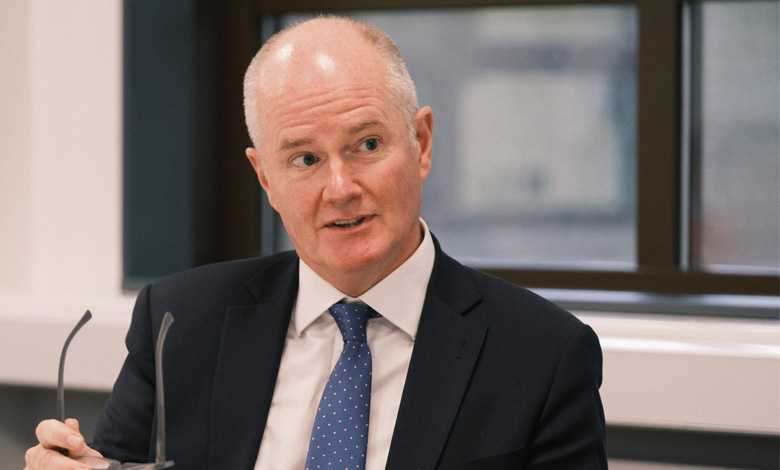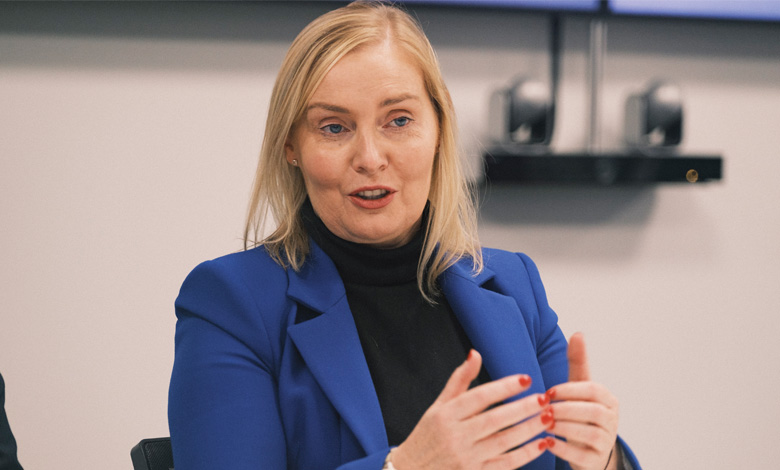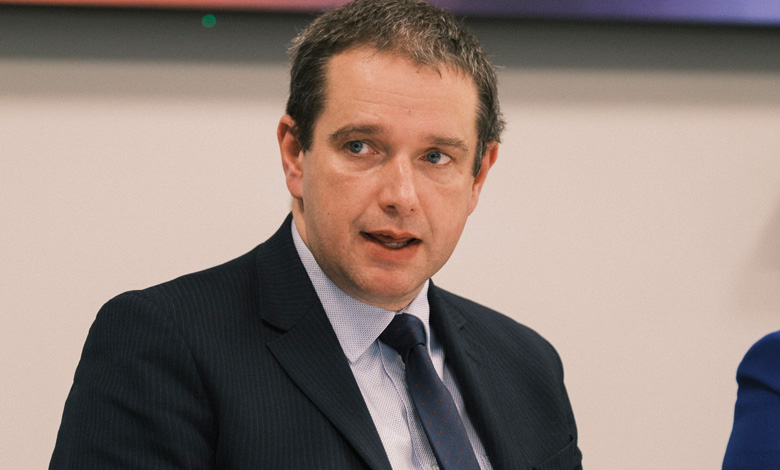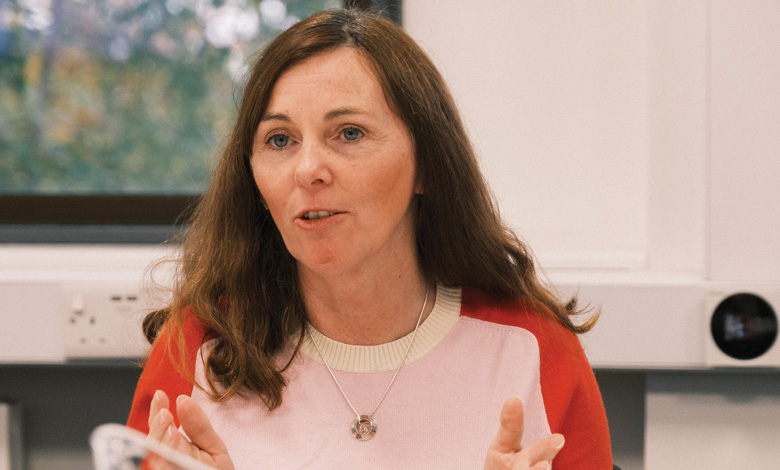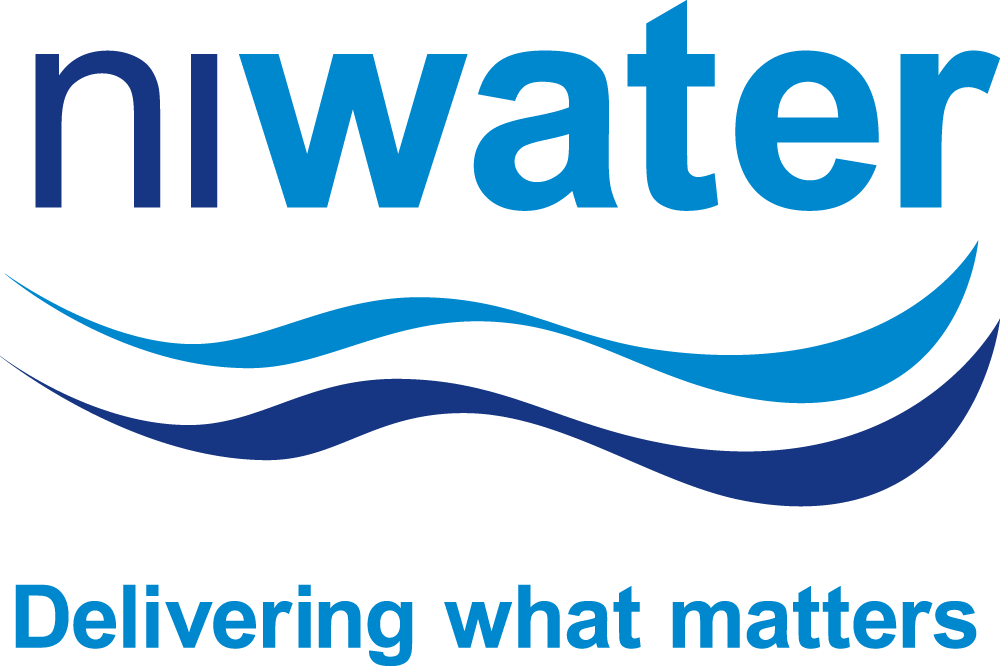Critical infrastructure for a globally competitive and sustainable economy
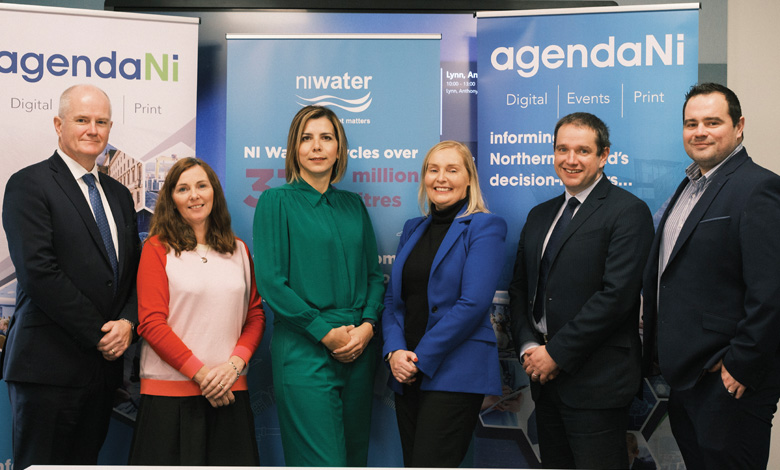
NI Water hosted a round table discussion with key stakeholders from across the local economy to discuss the vital role of critical infrastructure in underpinning economic and environmental improvement ambitions.
What is the role of critical infrastructure in supporting the ambition to develop a globally competitive economy?
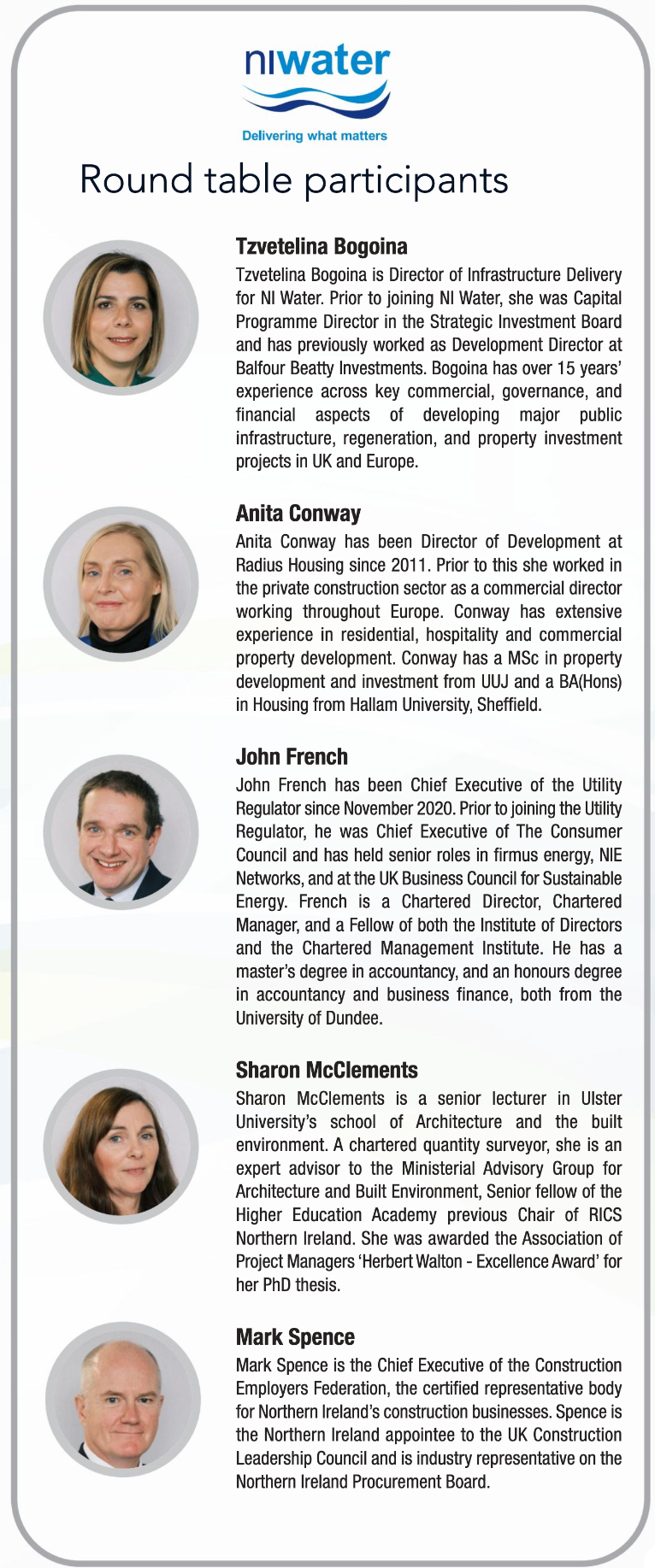
Sharon McClements
Infrastructure is fundamentally important to society. There is an obvious benefit, for example, of investing in health and social care infrastructure. Similarly, we can understand the socioeconomic and environmental damage when we do not invest in infrastructure, as exemplified by the Lough Neagh crisis. Many young people appreciate that there must be greater investment in underpinning infrastructure so they can make their futures here in Northern Ireland.
Mark Spence
When we talk about a global economy, we can look at indigenous businesses which have grown and thrived in Northern Ireland, but we also need to have a nuanced discussion about foreign direct investment (FDI). Investors want guarantees that when their workers locate here, they have access to good infrastructure to underpin a good quality of life. Unfortunately, the region is beyond failing against that criterion and the reality is that investment is finding a welcoming home elsewhere. We must give confidence to the local indigenous market, and to FDI, that we can match their ambitions.
Tzvetelina Bogoina
From a public health perspective and an economic perspective, clean water and wastewater infrastructure is of paramount importance. NI Water wants to ensure that there is effective and sustainable water and wastewater infrastructure to support a thriving economy. We also acknowledge that the environment plays a crucial role for people deciding where they want to live and work. In recognition of this, we are investing in wastewater treatment works and pipe networks, ensuring that we protect the environment from pollution and mitigate the potential effect where pollution may occur. We have a lot of great examples where investment in infrastructure has supported critical development in various sectors such as housing and manufacturing, but we should not forget that these investments cannot be seen as a one-off. We need sustained investment that addresses the challenges across the whole network.
Anita Conway
For anyone seeking to invest in Northern Ireland, it is essential that our infrastructure delivers reliable, effective, and affordable services for everyone. When we talk about infrastructure, we need to be conscious about our capacity to plan and build, and ensure that everything is built for, and in support of, innovation. With the emergence of new technologies, especially AI, there are ways in which we can make systems much more efficient, effective, and embolden infrastructure projects. However, we need to assess if what we are doing now enables us to build in the capacity for those technologies.
John French
Infrastructure is the foundation of everything we do. Unless you have the critical infrastructure in place, you cannot build houses, you cannot have functional hospitals, and the opportunity for more tourism cannot be grasped. As we move towards net zero targets, infrastructure is the cornerstone of everything that we need, and investment in infrastructure provides a boost and an uplift for the whole of society. Take the new Ulster University campus in Belfast, and the new Grand Central Station as examples, people are encouraged by these developments and they help encourage investment into Northern Ireland.
“The modernisation and sustainable development of our infrastructure is critical our environment and economy.”
Tzvetelina Bogoina
The draft Programme for Government recognises a historic underfunding of wastewater infrastructure and pledges to work to increase capacity, in what sectors can increased capacity serve as the biggest enabler?
Tzvetelina Bogoina
The largely ‘hidden’ nature of water and wastewater infrastructure means it is often taken for granted. Water and wastewater are critical to most, if not all economic sectors. Take housing, for example, housing development cannot happen without sufficient capacity in our systems to safely take way the wastewater from the new homes. Yet, decades of historic underinvestment have resulted in wastewater assets not being modernised or delivered at the pace needed. As a result, despite overarching ambitions to grow the economy, industrial development is being curtailed. Simultaneously, economic growth is just one part of the challenge, we also must ensure that we have a region in which people want to live and visit. Having environmental sustainability and remaining a region of natural beauty requires underpinning infrastructure.
Mark Spence
The draft Programme for Government contains nine priorities, but we would argue that investment in underlying infrastructure should be the tenth, and most important priority. We are pleased to see that housing has been identified as a priority, but that sector can only be enabled if the infrastructure exists. Currently, there is a crisis of confidence in the construction sector around housebuilding and there are an estimated 37,000 homes that cannot be built because of a lack of connectivity to water infrastructure. Housing is a fundamental sector not just for the economy, but for societal health and wellbeing. We must begin looking at our economic and societal ambitions through the prism of infrastructure.
John French
If we want our cities and towns to grow then we need to invest in wastewater and clean water systems to underpin that growth. Modern society must provide clean drinking water, but it is important that historic underinvestment in the less visible wastewater infrastructure is recognised. As our population grows, as we build more houses, and as we try to attract more people to this region, there is a need to ensure that wastewater infrastructure keeps pace with this development.
Anita Conway
There is a clear interdependence between critical infrastructure and our economic future. If we cannot connect new homes, then where will the essential workforce live to ensure the economic future of or cities and towns? It could mean Northern Ireland becomes less attractive from a talent retention perspective. Similarly, growth will fail to reach more rural and small economic hubs as we endeavour to address regional economic imbalance. Environmental considerations are also critical. Our climate is changing, as evidenced by the increased frequency and intensity of local and global extreme weather events. We must build resilience into our infrastructure if we are to manage these events. Currently, we are retrospectively addressing this challenge at huge cost, but this approach is unsustainable.
Tzvetelina Bogoina
It is worth reiterating that no one in NI Water believes it is acceptable to refuse new connections and inhibit major project development. In the absence of capacity, we work collaboratively with developers to design practical solutions that would enable projects where possible. However, once a system is at or beyond capacity it is already underperforming in environmental terms. The connection of greater load would mean greater environmental harm, and we cannot countenance that. The modernisation and sustainable development of our infrastructure is critical to our environment and economy.
Sharon McClements
The draft Programme for Government lacked substance, and I think it was a missed opportunity to be a programme of change for Northern Ireland. There is still a siloed mentality in the priorities of Executive departments and respective economic sectors. It cannot provoke competition for investment, rather it must determine how we can invest in the region as a whole.
“We must begin looking at our economic and societal ambitions through the prism of infrastructure.”
Mark Spence
Outline the challenges to increasing critical infrastructure? Is there a need for greater innovation beyond increased investment?
Anita Conway
Finance is the most significant challenge but we must consider the return on investment. Take wastewater as an example of critical infrastructure investment; the primary rationale for increased investment is to increase capacity. However, how is this investment being assessed for its secondary benefits? For example, constructing systems of sustainability whereby wastewater can be treated and reused to support manufacturing processes or our agricultural sector.
The reality is that if we were given £10 billion tomorrow morning we could not instantly solve every problem because we have not yet fully explored the intricacies and benefits of building critical infrastructure systems on a collaborative basis. There are barriers to progress beyond finance and we must ensure that when investment is available, we are utilising it in a smarter way, which will bring long-term benefits.
“There is a need for greater collaboration to maximise the money that does exist, including the regeneration and reutilisation of existing infrastructure.” Anita Conway
John French
Northern Ireland is the most economically disadvantaged region of the UK. The average household has a discretionary spend which is half that of the UK equivalent, and the lowest income households have just £50 of discretionary spend per week after essential bills. The financial resilience of the consumer is low, but it is the consumer that will need to fund the huge level of investment needed. We need an honest debate with households, consumers, business, and society in general about what infrastructure we require and can afford.
Tzvetelina Bogoina
Beyond the primary obstacle of securing adequate funding and involving stakeholders in honest conversations around what is affordable, there is also the challenge of meeting increasing legislative requirements. We are in a climate emergency and therefore the limited investment that we do have must be utilised in a way that simultaneously addresses these challenges. NI Water has been recognised for its innovation. Since establishment in 2007, we have closed a nearly 50 per cent efficiency gap with comparable neighbouring water companies down to within 5 per cent and continue to stretch the boundaries of what is possible. The creation of our Intelligent Operations Centre in the past five years is a prime example of how we have combined collaborative working with advanced analytics and robotic processing tools to better understand our network, to take preventative action and ultimately, to improve outcomes for our customers. Similarly, our integrated catchment base approach, addressing flooding risk, pollution, and capacity constraints, embodied in the Living with Water Programme is an industry-leading exemplar being rolled out across the UK and Europe. NI Water recognises that doing the same thing will result in the same outcome and have demonstrated our desire to do things differently for better outcomes.
“The financial resilience of the consumer is low… We need an honest debate with households, consuamers, business, and society in general about what infrastructure we require and can afford.”
John French
Sharon McClements
I think the greatest challenge is the absence of a ‘functioning’ Executive. What I mean by that is an Executive that works to deliver for the whole region and not specific areas. Funding is a challenge, but we need a different approach to how investment is prioritised. Climate is a good example of the need for a different approach. We are all accepting and comfortable with the need to invest in and increase renewables as we strive towards net zero but there is nowhere near the same focus on mitigating climate change. That is where we need innovative thinking and where we need to re-think where investment will land best to ensure the greatest outcomes for the whole region.
Mark Spence
If the draft Programme for Government is the aspiration, then the draft Investment Strategy is the expression. Our understanding is that the strategy will outline £26 billion of investment over the next 10 years. To the public that may present as a lot of money, but the reality is that it is little more per year than is currently being spent, which is vastly insufficient for our aspirations and our needs. I do worry sometimes that we as a society have become desensitised to our situation or that we collectively suffer from a short attention span of the critical investment challenges and therefore appear too accepting. There is a need for a fact-based conversation, acknowledging that we cannot fund everything, but recognising that to accept the status quo of current infrastructure spending levels would be disastrous.
I take some hope from the planned revitalisation of the Housing Executive, a mechanism that will allow it to raise capital. I see no reason why if the principles of that are acceptable to the Executive, why those principles could not be applied to NI Water. As a region, there are solutions available to alleviate funding constraints, but our politicians must be much more ambitious.
“It is important to point out that 85 per cent of our infrastructure for 2050 is already built, so we cannot simply apply the sustainability lens to new infrastructure.”
Sharon McClements
How important is the focus on sustainability and ensuring solutions improve environmental outcomes?
Anita Conway
A sustainability focus is important because it again comes back to breaking the cycle of near-term investment decisions. There are homes being built now which, in five to 10 years’ time, are going to need retrofitted to meet regulatory standards, and that retrospective cost will be multiples of what it would have cost had solutions been applied sooner. There is a similar theme across all critical infrastructure as we seek to improve capacity, the full life cycle costs are not being considered by those providing the funding. There is a need for greater collaboration to maximise the money that does exist, including the regeneration and reutilisation of existing infrastructure.
Tzvetelina Bogoina
Sustainable practices are vital, and across almost all industries there is a cognisance of how our collective operations impact on our environment. We cannot ignore that. We cannot just park sustainability for another time when there might be more money. Instead, we need to find more innovative and proactive ways to employ those solutions and ensure that the decisions being taken are being done with a whole life cycle approach. The way we collectively deliver our infrastructure projects must be viewed through the prism of value for money, affordability, and sustainability.
Mark Spence
We often encounter clients who are, through necessity, having to operate on a ‘make do and mend’ approach, rather than taking a lifecycle approach to investment. It is frustrating to us as an industry because often we present better solutions, which are deemed as not representing value for money within the current annual budget context in which we are operating. In the housing sector, there are many developers who would like to make their sustainable homes a unique selling point, but the reality is that there is a postcode lottery on what developments can connect to critical infrastructure such as electricity and water. The result is a two-tier housebuilding environment whereby those who can afford it can avail of sustainable solutions. The pipeline of work of social and affordable homes is essentially being killed because of the costs associated with accessing capacity in our critical infrastructure.
Sharon McClements
Sustainability must be at the heart of infrastructure decision-making because if you are not building, designing, implementing, and managing infrastructure to meet needs today and tomorrow then it quickly becomes obsolete. It is important to point out that 85 per cent of our infrastructure for 2050 is already built, so we cannot simply apply the sustainability lens to new infrastructure. Other jurisdictions have successfully created one-stop-shop retrofitting solutions, where expertise and guidance are centralised. I would argue that the approach could be extended to all infrastructure here in Northern Ireland.
John French
The Northern Ireland Assembly and Executive have already set the destination in the form of the legislative targets included in the Climate Change Act. What we do not have is the route map to get to that destination in the most effective and efficient manner.
Tzvetelina Bogoina
We have a deliverable plan, which we work hard alongside the regulator to ensure, is in the best interest of the consumer and is the right thing to do. Our Price Control is not a wish list, it is what has been regulated as the minimum needed to serve the best interests of this region and its population. We know what we need to do, we know how we can do it, and we have the technical expertise and supply chains in place to deliver, however, the missing link is funding this in a sustainable way to support all of our ambitions for the best outcomes.
Outline one priority action for delivering a globally competitive and sustainable economy.
Tzvetelina Bogoina
A sustainable funding model that provides ring-fenced, multiannual budgets to utility companies at the level determined by independent regulators, thereby enabling the necessary operational and infrastructure delivery.
Sharon McClements
I would advocate for a new funding model based on greater collaboration between the public and private sectors. From listening to what the new UK Government has said, we are entering a new era, moving towards a greater focus on PPPs.
Mark Spence
Speaking on behalf of our contractors, we need on-the-ground and practical cooperation with NI Water. At the moment, we have numerous contractors, house builders, and developers who are telling us that their projects in Northern Ireland are nearly complete, and that they will cease operations here and take their work programmes to other jurisdictions. We need to give a lifeline to the contractors until we get sustainable funding.
Anita Conway
We need to equip our young people with the necessary skills so they know how they can make an impact on sustainability. Executive policy is now set to mandate young people to stay in education until they are 18, but there is little detail around how we can equip them with the digital skills they are going to require when entering the construction industry. As the workforce ages it is vital that we identify pathways for our future construction workers and consultants to see the opportunities in having a career in building our future.
John French
We need open and honest conversations. We know what the ambition is and yet we are still having siloed conversations. If we want regional economic development, then that must tie in with good infrastructure, and having those open conversations about what is affordable, and when.


